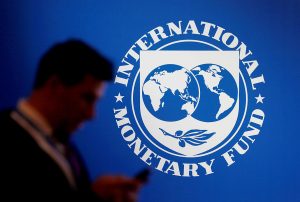WASHINGTON – The International Monetary Fund warned on Tuesday that lurking financial system vulnerabilities could erupt into a new crisis and slam global growth this year, but urged member countries to keep tightening monetary policy to fight persistently high inflation.
The warnings set an ominous tone for the IMF and World Bank spring meetings in Washington this week, with conflicting economic and market forces clouding the policy path as growth slows in response to rapid central bank interest rate hikes.
The IMF on Tuesday edged its 2023 global growth forecasts lower, its baseline assumptions excluding, for now, a major new flare-up of financial system turmoil after the failures in March of U.S. lenders Silicon Valley Bank and Signature Bank and Switzerland’s forced sale of Credit Suisse.
The Fund’s World Economic Outlook forecast real GDP growth of 2.8% in 2023 and 3.0% in 2024 – one-tenth of a percentage point lower than what it predicted in January for each year. The global economy grew 3.4% in 2022.
The downgrades reflected weaker performances in some larger economies, such as Japan, Germany, India and Brazil, offsetting a stronger performance in the United States and a shallower contraction in Britain. The IMF also cited expectations of tighter financial conditions this year.
But its forecast was dominated by downside risks, including even higher inflation, an escalation of the war in Ukraine and a severe adverse scenario of a new financial crisis that could prompt sharp pull-backs in lending and household spending and a rush into safe-haven assets. The latter could slam global growth back to about 1% this year, effectively a recession on a per-capita GDP basis.
‘PERILOUS’ RISKS
The IMF’s Global Financial Stability Report warned of a “perilous combination of vulnerabilities” in financial markets, saying that some participants had failed to adequately prepare for the impact of interest rate increases.
Such risks had increased rapidly in the wake of last month’s turmoil in the global financial system, with investors remaining on edge and some looking for the next weakest link that could spread contagion, IMF officials said.
“Even if you think that on average, banks have a lot of capital and liquidity, there could be these weak institutions that then spill back into the system as a whole,” Tobias Adrian, the director of the IMF’s Monetary and Capital Markets Department, told Reuters.
Despite the warnings, the IMF’s chief economist, Pierre-Olivier Gourinchas, said inflation is still the bigger problem and that price stability should take precedence over financial stability risks for central banks’ monetary policy. Only in the event of a very severe financial crisis should those priorities be reversed, he said in a news conference.
YELLEN PUSHBACK
U.S. Treasury Secretary Janet Yellen pushed back on the IMF’s outlook, telling a separate news conference that the outlook was “reasonably bright” though she said she was staying “vigilant” to downside risks including banking pressures and the war in Ukraine.
“I wouldn’t overdo the negativism about the global economy,” Yellen said, adding that a number of economies, including the United States, were proving resilient with strong labor markets, easing supply chain problems and lower energy costs.
Yellen said she had not seen evidence of a squeeze in credit after the SVB and Signature Bank failures, and that the U.S. banking system was sound, with strong capital and liquidity positions. She added that the global financial system was also resilient due to reforms enacted after the 2008 financial crisis. — Reuters

